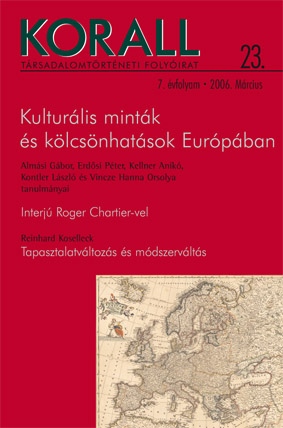Miért Cicero? A cicerói értelmiségi modell és értékek reneszánsz adaptációjáról
Why Cicero? The adaptation of Cicero’s role model and cultural values in the Renaissance
Author(s): Gábor AlmásiSubject(s): History
Published by: KORALL Társadalomtörténeti Egyesület
Summary/Abstract: Cicero’s utmost importance for the culture of Renaissance humanism seemingly does not require further comments. In fact, the eminence of his style was never questioned, while the exceptional number of his surviving writings, their moral and political orientation, and the wealth of information which they transmitted regarding the Antiquity guaranteed that Cicero was never really forgotten during the Middle Ages. However, the author argues that it was primarily neither Cicero’s style and Latinity nor his moral and political message that so much impressed the fi rst generations of Renaissance humanists but the model of the intellectual he had realised, the new values he had emphasised. Like Cicero, most prominent humanists came from a similar social milieu and strived to carve their place in a society that traditionally prized inherited status and not merit. To create the authentic image of the intellectual – a role that had been previously played by clericals – the humanist needed to establish a new cultural value system (and make accepted by the elite) where virtue, erudition and industry could have as much credit as noble status. In this striving Cicero the novus homo provided the most important authority for them, Cicero whose deeds and words seemed so much in accord with each other. While low status, marginal position, exile, the lack of political relations when combined with learning and ambition could enhance the spirit of social criticism, the creation of new cultural values, in order to represent these values in an authentic way the intellectual had to preserve or invent a marginal position for himself that lay outside the realms of power. Th ese paradox produced the ambiguities (like in the attitude to vita activa/contemplativa, or in the relations to power) that make the life and thinking of Cicero, of his follower Petrarch and of other great Renaissance intellectuals so interesting. In order to sustain the above argument the author fi rst outlined the way Cicero achieved fame and became an unquestioned political and intellectual authority in his age. He went on to introduce the example of some humanists – from Petrarch to Bracciolini – detailing how they adopted the model and cultural values Cicero represented fi nishing the paper with two counterexamples: Machiavelli and Montaigne. He argues that both reacted against Ciceronian humanism not because they were against Cicero’s style but for both rejected the career strategies, and the ideology of virtus that Cicero and his Renaissance followers came to represent.
Journal: Korall - Társadalomtörténeti folyóirat
- Issue Year: 2006
- Issue No: 23
- Page Range: 60-85
- Page Count: 26
- Language: Hungarian

